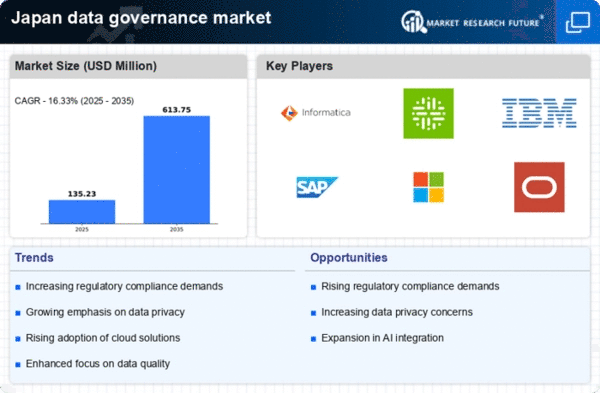Increased Data Breaches
The frequency of data breaches in Japan has escalated, prompting organizations to prioritize data governance. High-profile incidents have underscored vulnerabilities in data management practices, leading to a heightened awareness of the need for comprehensive governance frameworks. In 2025, it is projected that the cost of data breaches in Japan could exceed $3 billion, which emphasizes the financial implications of inadequate data governance. Consequently, businesses are increasingly investing in data governance market solutions to enhance their security posture and protect sensitive information. This trend suggests that the data governance market will continue to expand as organizations seek to implement preventive measures against potential breaches.
Emphasis on Data Stewardship
The growing emphasis on data stewardship within organizations in Japan is shaping the data governance market. As businesses recognize the value of data as a strategic asset, the role of data stewards has become increasingly vital. These professionals are responsible for ensuring data quality, compliance, and accessibility, which are essential components of effective data governance. In 2025, it is projected that the demand for data stewardship roles will increase by 15%, reflecting a broader trend towards accountability in data management. This shift suggests that organizations are likely to invest in training and tools that support data stewardship, thereby driving growth in the data governance market.
Rising Regulatory Frameworks
The increasing complexity of regulatory frameworks in Japan is a primary driver for the data governance market. With laws such as the Act on the Protection of Personal Information (APPI) and the Financial Instruments and Exchange Act, organizations are compelled to adopt robust data governance practices. Compliance with these regulations is not merely a legal obligation but also a strategic necessity to maintain consumer trust. As of 2025, it is estimated that compliance-related expenditures in the data governance market could reach approximately $1.5 billion, reflecting a growing recognition of the importance of data governance in mitigating legal risks. This trend indicates that organizations are likely to invest significantly in data governance solutions to ensure adherence to these evolving regulations.
Growing Demand for Data Analytics
The surge in demand for data analytics in Japan is significantly influencing the data governance market. As organizations strive to leverage data for strategic decision-making, the need for effective governance frameworks becomes paramount. In 2025, the analytics market in Japan is expected to grow by approximately 20%, driving the necessity for data governance to ensure data quality and compliance. This growth indicates that organizations are likely to invest in data governance solutions to facilitate accurate analytics while adhering to regulatory requirements. The interplay between data analytics and governance is likely to shape the future landscape of the data governance market.
Shift Towards Digital Transformation
The ongoing digital transformation across various sectors in Japan is a critical driver for the data governance market. As organizations increasingly adopt digital technologies, the volume and complexity of data generated have surged. This transformation necessitates robust data governance frameworks to manage data effectively and ensure compliance with regulations. By 2025, it is anticipated that investments in digital transformation initiatives will reach $10 billion, further propelling the demand for data governance solutions. This trend indicates that organizations are likely to prioritize data governance as an integral component of their digital strategies, thereby fostering growth in the data governance market.

















Leave a Comment